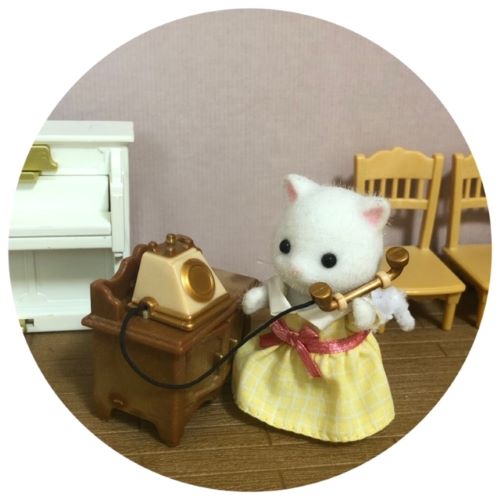
ねこは最近電話のかけ方を覚えました。だからいろんな人に電話をかけたくて仕方ありません。今日もお父さんに電話をかけました。
ねこ:「もしもしーおとうさーん、IKEA行ける〜?」
パパ:「今会社でお客さんいるから、また電話かけ直すわ。」
パパはそう言って電話を切った。
ねこはそのまま受話器を耳に当てたまま待っていた。
ねこ:「うるさ〜い!」(電話が切れた音)
私:「どうしたの?」
ねこ:「お父さんがかけ直すって言ったから待ってるの。」
私は笑ってしまった。
私:「受話器置かないとお父さんかけ直してこれないよ(笑)」
ねこは電話をかけたことはあったけど、かけ直しの電話を待ったことがなかった。だから電話を切らずにお父さんがまた話し出すと思って待っていた。
大人には当たり前の事でも、子どもにとって初めての出来事ってたくさんあるなーと改めて気づきました。
Neko recently mastered how to make phonecalls.
As a result, she would call people all day if she could. Today, she called her father.
Neko: “Hey, dad, can we go to IKEA?”
Dad: “I’m with a customer at work, so I’ll call you right back!”
After saying so, dad hung up the phone.
Neko sat and waited with the phone to her ear.
Neko: “It’s so looouud!” (the sound of the phone)
Me: “What’s wrong?”
Neko: “Dad said he would call me right back so I’m waiting!”
I laughed.
Me: “Dad can’t call you back until you put the phone down!”
Neko had called people before, but she had never waited for someone to call her back, so she waited, expecting her father to start talking again. I realized once more how lots of things we grownups take for granted can be completely new to children.
WORDS
- ~のやり方(~のやりかた)=how to ~
- 電話を切る(でんわをきる)=hang up
- 何かを待つ(なにかをまつ)=sit and wait
- 改めて(あらためて)=once more
- 当たり前に思う(あたりまえにおもう)=take for granted
REMARKS
もしもし : In Japan, we answer the phone with “moshi-moshi” regardless of who is on the other end, it is applicable in all situations.
かけ直す;何かをし直す
~直す means to do something over, or again, often but not always implying the first try was not successful.
for example
(電話を) かけ直す
(宿題を) やり直す
(写真を) 撮り直す


